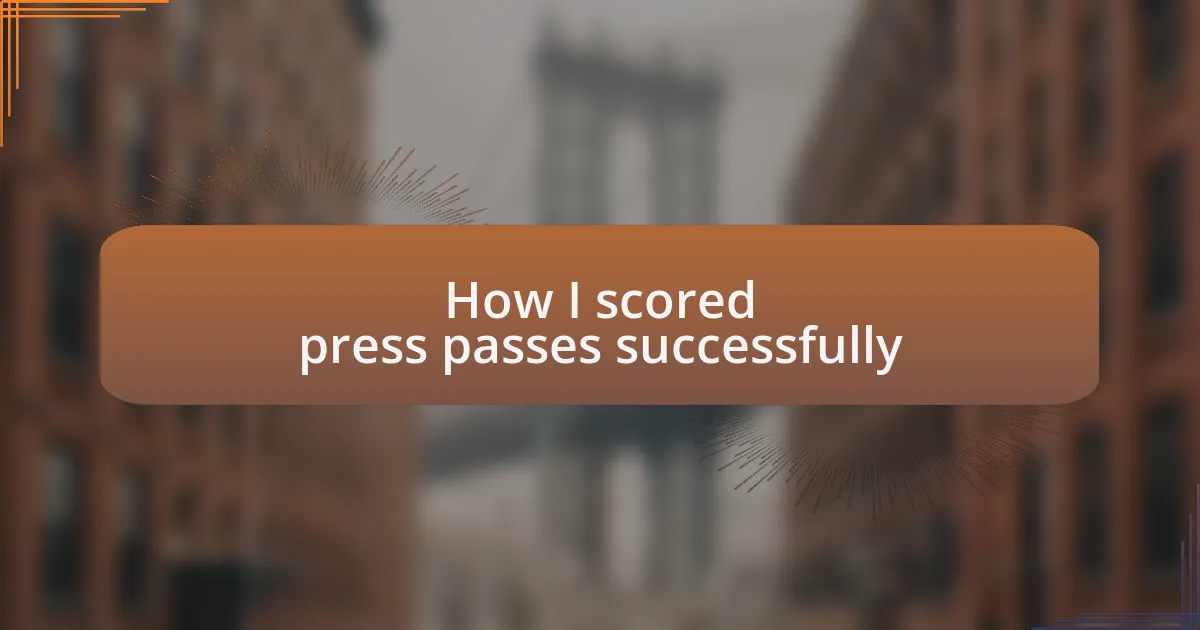Key takeaways:
- Press passes provide essential access to exclusive events, enhancing networking and engagement in the independent film community.
- Understanding the differences between types of press passes—general, specialized, and digital—can significantly impact a journalist’s experience and coverage opportunities.
- A press pass elevates a journalist’s credibility, allowing them to present insights and perspectives that resonate within the industry.
Author: Evelyn Hartwood
Bio: Evelyn Hartwood is a captivating storyteller and novelist known for her richly woven narratives and complex characters. With a passion for exploring the intertwining of human emotions and the natural world, her works often blend elements of magical realism with contemporary themes. A graduate of the Iowa Writers’ Workshop, Evelyn has published several acclaimed novels and short stories in prestigious literary magazines. When she’s not writing, she enjoys hiking in the mountains of her Pacific Northwest home and nurturing her garden. Evelyn continues to inspire readers with her unique voice and profound insights into the human experience.
Understanding press passes
Press passes are essential for anyone seeking to cover events, especially in the vibrant world of independent film. I still remember the thrill of my first press pass; it felt like I had a backstage key to the indie film scene. There’s something both exhilarating and daunting about walking into a venue knowing you have the right to capture the moment.
Understanding the purpose of a press pass is key. Essentially, it grants access to film screenings, interviews, and other industry events that are otherwise closed to the public. Have you ever thought about how it feels to be in a room filled with creatives, knowing that your role is to share their stories? That’s the power of a press pass; it isn’t just a credential, it’s an invitation to become part of a narrative that unfolds right before your eyes.
It’s crucial to grasp that not all press passes are equal. Some provide full access, while others may only grant limited entry. I once attended a festival where my basic press pass felt like a tether, keeping me close to the action but just outside the most coveted spaces. The lesson? Knowing the limitations and privileges of your pass can make or break your experience.
Importance of press passes
Press passes are vital because they not only provide access but also open doors to opportunities that would otherwise remain closed. I still remember my first encounter with a filmmaker at a press event; it felt surreal to ask questions and get insights from someone I admired. Can you imagine the connections that can spark from such interactions? The chance to network with industry professionals enhances the whole experience, making your work much more enriching.
Moreover, having a press pass allows you to engage with the content on a deeper level. I recall attending a film screening with limited public visibility; it felt like being part of an exclusive club. When I entered that screening room, I wasn’t just a spectator; I was an integral component of the film’s journey from creator to audience. This involvement helps foster a sense of purpose, as you contribute to the storytelling process by sharing these unique insights with your readers.
On a practical level, press passes can elevate your credibility. Being recognized as a member of the press gives weight to your voice in the independent film community. I once published an article following a festival where having that pass allowed me to present my perspectives to an audience that recognized my authority. Isn’t it fascinating how a simple piece of paper can amplify your impact in such a meaningful way?
Types of press passes
The landscape of press passes is diverse, catering to various levels of access and opportunities. For instance, I often come across general press passes that grant entry to public events, allowing coverage of red carpets and film screenings. They effectively serve as a gateway, enabling one to mingle with filmmakers and fellow critics, creating moments that can lead to future stories.
On the other hand, there are specialized press passes, like VIP or industry-specific ones. I vividly remember attending a niche film festival as a VIP press. It felt different, almost electric. The access to exclusive interviews and behind-the-scenes content was unparalleled. Have you ever felt like you were part of a select group where secrets of the craft were revealed? That’s the power of specialized passes—they give you a front-row seat to the magic of filmmaking.
Then there are digital press passes, which have gained traction in recent times. These allow access to virtual screenings and online events, something I’ve heavily relied on lately. I appreciated the convenience but also felt the longing for the in-person experience. How do these digital interactions influence the depth of our coverage? It’s a balance between immediacy and the richness of personal connection—a dialogue worth exploring in the evolving landscape of independent film journalism.
